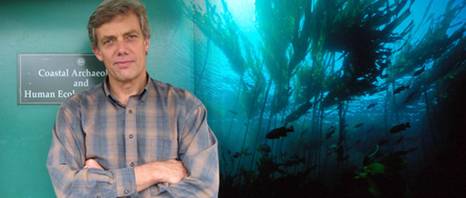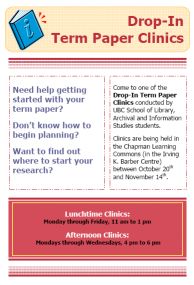November 10th, 2008 by Susan Atkey | No Comments »

You’ve likely heard about RefWorks, the online citation management tool that allows you to save references for your research paper from online databases such as AnthropologyPlus and Google Scholar, and then formats your paper in the citation style of your choice. Perhaps you’ve had a chance to get started with RefWorks, but need some help in using its many features.
This Wednesday is your chance to find out more! Come to Koerner Library for a RefWorks session from 10:00am-312:00pm.
Workshop is free, but please register here.
Posted in Workshops and Tutorials | No Comments »
November 3rd, 2008 by Susan Atkey | No Comments »

Karen Hinton of Proquest will be offering training on the suite of Community of Scholars (COS) research tools the UBC Library, in partnership with the UBC Office of Research Services, has recently acquired on behalf of the UBC community.
When: Tuesday, November 4, 2008; 3:00 – 5:00pm, Koerner Library, Room 217.
Register for the session here.
The COS suite of research databases includes the following:
COS Funding Opportunities, the world’s largest compendium of available funding sources, with more than 25,000 current opportunities for grants, fellowships, and awards
COS Scholar Universe, an editorially controlled, keyword-searchable database with nearly 2 million profiles of scholars.
COS Papers Invited, a database of calls for papers for conferences and journal special editions.
COS Expertise, a profile management system that enables institutions to keep track of their faculty’s expertise and research work, with first-person profiles maintained by the faculty themselves.
Posted in Workshops and Tutorials | No Comments »
November 3rd, 2008 by Susan Atkey | No Comments »

(Image credit: carf)
You know they’re out there, but do you know how to find the best images for your presentation, paper or portfolio? And what are the rules about using other people’s images? Fifty minutes in this workshop will have you well on your way to being a proficient finder and user of digital images.
Wed 05 Nov 2008
12:00 PM – 1:00 PM
Koerner Library, Room 216
The workshop is free, but please sign up here.
Posted in Workshops and Tutorials | No Comments »
October 30th, 2008 by Susan Atkey | No Comments »

You know that lots of journals and magazines are published on the web. But where? This workshop will show you where to look — whether you’re starting with a bibliography, an author’s name, a topic, or just an idea.
Mon 03 Nov 2008
12:00 PM – 1:00 PM
Koerner 216 (Arts Lab)
Workshop is free, but please sign up here.
Posted in Workshops and Tutorials | No Comments »
October 29th, 2008 by Susan Atkey | No Comments »

A reminder of a talk today by Dr. Jon Erlandson at 11am in 120 AERL:
Neptune’s Children: An Archaeological History of Human Seafaring, Fishing, and Impacts on Marine Ecosystems
Dr. Erlandson is a professor in the department of Anthropology and a Knight professor of Arts and Sciences at the University of Oregon. He is also the executive director of the University of Oregon’s Museum of Natural and Cultural History, and a co-editor of the Journal of Island and Coastal Archaeology. Dr. Erlandson has taught as well as conducted research in California and Alaska, and has explored the Viking Age sites in Iceland. His research revolves around the origins and development of maritime societies, human migrations, historical ecology, and the history of human impacts on marine fisheries and ecosystems. He also revealed the “Kelp Highway Hypothesis”, suggesting another theory regarding the peopling of the Americas.
For more on Dr. Erlandson’s recent research, see this BBC news story: http://news.bbc.co.uk/2/hi/science/nature/5398850.stm
Books by Dr. Erlandson can be found in Koerner Library, including:
– Canyon through time : archaeology, history, and ecology of the Tecolote Canyon area, Santa Barbara County, California
– Human impacts on ancient marine ecosystems : a global perspective
– Early hunter-gatherers of the California coast
Posted in Uncategorized | No Comments »
October 27th, 2008 by Susan Atkey | No Comments »
A reminder of the upcoming ANTH colloquium, presented by Sandra Evers, 11:30 – 13:00 ANSO 205
Longing and Belonging in Real Time: How Chagossian Children in Mauritius See Themselves and the Chagos Islands
The original inhabitants of the Chagos islands in the Western Indian Ocean were deported from their archipelago to the Seychelles and Mauritius during the late 1960s and early 1970s to make way for a U.S. military base. This paper is based on a study of a group of those Chagossians who settled in the poorer quarters of Port Louis, the capital of Mauritius. The research focussed on Chagossian children enrolled in the final years of primary school and discusses the impact of Mauritian education policies and practices on these pupils. The central query traces how gendered processes of marginalisation take shape in primary schools under the influence of a broader stereotype held by Mauritians that Chagossians are destined for a life in the margins of their society. Within this context, the challenges faced by Chagossian girls are discussed through their agency, interdependencies, coping strategies. This analysis is intertwined with their views on the historical fate of the Chagossians, their understandings of family history and imagined life in Chagos.
Sandra J.T.M. Evers is associate professor and senior researcher at the Department of Social and Cultural Anthropology, VU University Amsterdam. She specialises in South West Indian Ocean studies, with a particular focus on Madagascar, Mauritius and the Seychelles. Dr Evers’ principal areas of research cover migration, slavery, memory and cognition, identity construction, frontier societies within the context of globalisation, natural resource management, poverty and sustainable development.
Posted in Talks and Seminars | No Comments »
October 20th, 2008 by Susan Atkey | No Comments »

Need help getting started on your term paper?
Drop-in term paper clinics are offered in the Chapman Learning Commons between October 20 and November 14. Lunchtime clinics will run Mon – Fri 11am – 1pm and afternoon clinics will run Mon – Weds 4 – 6pm.
Posted in Workshops and Tutorials | No Comments »
October 17th, 2008 by Susan Atkey | No Comments »
A reminder of today’s ANTH Colloquia talk, 12-1:30 pm, Irving K. Barber Learning Centre Lillooet Room (Room 301):
The Black Hole of Empire, by Partha Chatterjee, Columbia University
Partha Chatterjee is an internationally renowned Subaltern Studies and Postcolonial scholar. He is a multi-disciplinary scholar, with special emphasis on political science, anthropology and history. He is a professor of Political Science and was the Director of the Centre for Studies in Social Sciences, Calcutta and is presently a Professor of Anthropology at Columbia University in New York.
UBC Library has a number of Dr. Chatterjee’s books, including:
Politics of the governed : reflections on popular politics in most of the world
A princely impostor? : the strange and universal history of the Kumar of Bhawal
For a full list, search the UBC Library catalogue by author.
Seminar cosponsored with the Department of Asian Studies, Department of Political Science and the Centre for India and South Asia Research (CISAR).
Posted in Talks and Seminars | No Comments »
October 9th, 2008 by Susan Atkey | No Comments »

UBC Library has joined SPARC (the Scholarly Publishing and Academic Resources Coalition), the Public Library of Science (PLoS), and Students for FreeCulture and 65 other institutions in the First International Open Access Day.
What is Open Access?
Open Access is a growing international movement that uses the Internet to throw open the locked doors that once hid knowledge. It encourages the unrestricted sharing of research results with everyone, everywhere, for the advancement and enjoyment of science and society.
(From: http://openaccessday.org/what-is-open-access)
To help us celebrate this event we are proud to present a number of distinguished speakers in our community who will be describing how they participate in the open access movement.
Schedule of Events
Introduction to Open Access & cIRcle: UBC’s Information Repository
11am– 12:20pm
Joy Kirchner and Hilde Colenbrander (UBC Library)
Using Wikipedia in the Classroom: an OA medium for research and student work
1 pm – 1:40 pm
Dr. Jon Beasley-Murray (Department of French, Hispanic and Italian Studies, UBC)
The Public Knowledge Project: providing open source software for OA publishing
2 pm – 2:40 pm
Brian Owen (SFU Library)
Open Medicine: a peer-reviewed, independent, open-access general medical journal
3 pm – 3:40 pm
Dr. Anita Palepu (Internal Medicine, UBC)
OA Day Worldwide Webcast: taxpayer access to publicly funded research
4 pm – 5 pm
Keynote address: Sir Richard Roberts, Ph.D., F.R.S
Tuesday, October 14, 2008
11:00 am – 5:00 pm
Irving K. Barber Learning Centre, Dodson Room (302)
Posted in Open Access Publishing | No Comments »
October 6th, 2008 by Susan Atkey | No Comments »
A reminder of tomorrow’s Anthropology colloquium by Ron Kuzar, Department of English Language and Literature, University of Haifa
The Internal Palestinian Debate on the Right of Return: On National Discourses and Beyond
October 7th from 11:30-1:00 in ANSO 205
I will start with a (partial) lexical analysis of the term “return”. I will show how different meanings are selected in the internal Palestinian debate on the right of return between maximalists and pragmatists, and how reality is narrated so as to discursively harmonize with the lexical choices. Then I will present and discuss Anton Shammas’s short story Autocartography: The Case of Palestine, Michigan. Shammas (an Israeli Palestinian author, who writes in Arabic, Hebrew, and English, and is currently a professor of literature at Ann Arbor, Michigan) subverts, ridicules, and counters the whole debate from within, challenging thereby both the Israeli and the Palestinian national discourses from the vulnerable position of personal and collective hybridity.
Note: If you’d like to read the story beforehand, it has been reprinted in the Palestine – Israel Journal, 9(2), 2002, pp. 111–119. UBC Library subscribes to the Palestine Israel Journal online; you can find the reprinted story via here via Academic Search Complete.
The story also appeared in the the edited volume The Geography of Identity, available in print at Koerner Library.
Posted in Talks and Seminars | No Comments »







